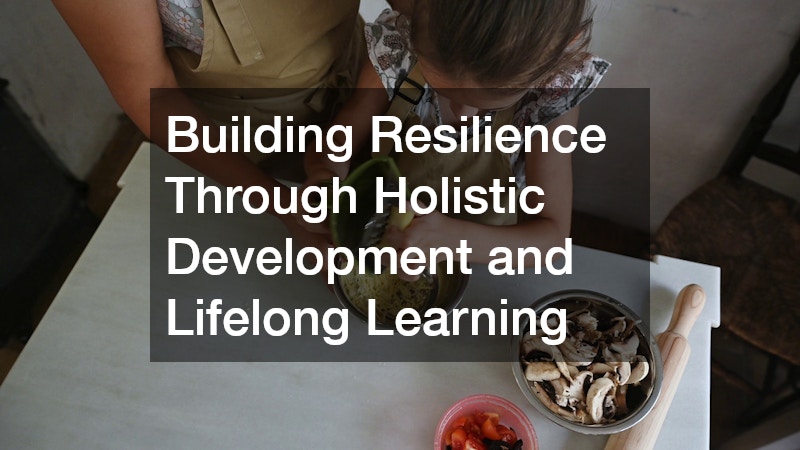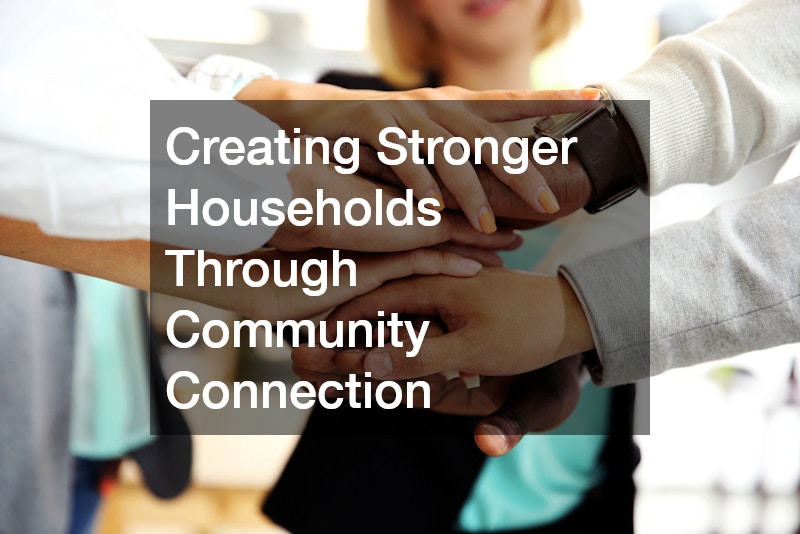Families often face periods of uncertainty, strain, and unexpected challenges that can disrupt daily routines and create emotional, financial, or logistical stress. During these moments, having access to the right resources makes a profound difference in maintaining stability and supporting long-term resilience. Family support services bring together a wide range of tools, programs, and community-based assistance designed to strengthen households when stress levels rise. Whether difficulties stem from personal transitions, economic strain, health concerns, or the practical realities of raising children, these supports create a buffer that helps families maintain balance and move forward with confidence. By offering guidance, access to community resources, and targeted help during stressful situations, these services play an essential role in ensuring that families have the stability they need when life becomes unpredictable.
Strengthening Emotional Wellness Through Integrated Care
Emotional strain is one of the most common challenges families face during difficult periods. Stress can stem from job loss, major life changes, health concerns, or internal conflict, and without adequate support, it can negatively affect relationships and household functioning. This is where family support services play an essential role, offering families a foundation of care that includes emotional guidance, crisis support, and community referrals. One of the most impactful forms of integrated care involves connecting families with behavioral health professionals who understand how emotional challenges influence both individuals and the entire household system. Access to this kind of support provides families with coping strategies, communication tools, and long-term wellness plans that foster healthier interactions.
Having professionals who can assess emotional responses, guide families through complex feelings, and help them navigate tension ensures that stress does not escalate into long-term dysfunction. In many cases, households benefit not only from counseling but also from learning how to approach emotional wellness as a shared responsibility. By bringing structure, clarity, and actionable strategies to emotionally overwhelming situations, these programs empower families to regain stability. Over time, the guidance offered through this branch of family support services builds resilience by encouraging open communication, empathy, and healthier coping habits. When emotional wellness is nurtured during crises, families are better equipped to maintain unity and stability as they face future challenges together.
Supporting Academic Success and Learning Stability for Children
Educational consistency is one of the most important factors in a child’s long-term success, but maintaining stability can be difficult when families are navigating stressful circumstances. Academic performance often declines when children experience major transitions such as parental separation, health issues, or economic hardships. In these moments, accessing the right community resources can provide structure and continuity. One example is the availability of a local sat tutor who can help ensure that older students stay academically on track even when their home environment feels disrupted. This type of educational support helps families maintain focus on long-term goals, preventing disruptions from derailing a child’s academic pathway.
Younger children also benefit significantly from academic stability, and family support services help connect families to institutions such as private middle schools when they need a specialized learning environment that offers structure and individualized attention. These schools can offer smaller class sizes, additional academic resources, and environments designed to support students experiencing personal or family-related stress. Families can also receive assistance identifying programs that match their needs, whether they are navigating a temporary crisis or seeking a more supportive educational setting.
By guiding families toward reliable academic resources, these programs ensure that children continue to grow intellectually even when life feels uncertain. Educational continuity helps protect a child’s sense of normalcy and provides emotional reassurance, creating a stabilizing effect for the entire household. When learning remains a priority and the right supports are in place, families experience greater confidence in their ability to manage challenges without compromising their children’s future.
Promoting Community Stability Through Reliable Child and Youth Care
Children thrive when they have access to consistent routines, safe environments, and engaging activities. During times of family stress, everyday responsibilities such as scheduling childcare, facilitating play opportunities, and maintaining social connections can become overwhelming. Family support services help bridge these gaps by connecting parents with community-based resources that ensure children remain engaged and supported, even when adults are juggling heightened demands.
For example, many families rely on local pediatricians to guide them through health-related questions, routine checkups, and developmental concerns. Access to trusted medical care not only ensures children stay physically healthy but also reduces parental stress by providing clarity and reassurance during uncertain times. In addition to healthcare support, families may also explore structured community activities that offer healthy social interaction. Parents can find options such as birthday party venues that provide safe, organized environments where children can play, celebrate milestones, and enjoy normal childhood experiences regardless of temporary stress at home.
For households facing behavioral or developmental challenges, structured programs like puppy training classes can indirectly support children by creating opportunities for positive interaction, responsibility-building, and emotional grounding. When families are connected with services that keep children active, engaged, and cared for, the entire household benefits. These supports reinforce stability by ensuring that children continue to thrive, learn, and maintain confidence even during challenging seasons of life. Over time, this contributes to a more balanced and supportive home environment, strengthening the foundation families rely on to navigate difficult periods.

Providing Conflict Resolution and Guidance During Family Transitions
Family transitions—such as divorce, separation, or major household changes—often create emotional and logistical challenges that disrupt stability. When families feel overwhelmed by decision-making or communication issues during these seasons, structured guidance is essential. Family support services play a crucial role by offering access to professional resources that guide families toward clarity and cooperation. One meaningful option is divorce mediation, which focuses on promoting respectful dialogue, fair decision-making, and long-term solutions that support both adults and children. Mediation reduces conflict, shortens the duration of transitional periods, and creates more stable outcomes for the entire family.
Many households also rely on the expertise of a family law firm to navigate legal processes with transparency and confidence. These professionals help families understand their rights, responsibilities, and options while preventing misunderstandings that can escalate tension. By facilitating informed decision-making, they provide much-needed stability when significant changes are underway. The role of these legal and mediation services extends beyond resolving disputes; they also offer families emotional reassurance and clear pathways forward during periods that might otherwise feel chaotic.
Support does not end with legal clarity. These programs often connect families with counseling, financial planning resources, and community-based support that help them rebuild after a major transition. When families are guided through change with compassion and professionalism, they are better equipped to maintain harmony and protect the well-being of everyone involved. Through structured intervention and consistent support, this aspect of family support services strengthens stability during some of life’s most challenging moments.
Encouraging Healthy Family Routines Through Accessible Community Resources
Daily routines provide essential structure, especially when families are dealing with stress or sudden disruptions. Maintaining predictable meals, schedules, and household responsibilities helps children and adults feel secure even when external circumstances feel unstable. Family support services assist households in preserving these rituals by connecting them to practical community resources that make day-to-day life more manageable. For instance, busy families may rely on options such as chinese food delivery to ensure that mealtimes remain consistent when cooking at home becomes difficult due to emotional strain, time limitations, or logistical challenges.
Access to healthy, affordable foods also strengthens family wellness, and some households benefit from having a local health food store nearby where they can find nutritious ingredients that support overall well-being. Being able to maintain healthy eating habits during challenging times ensures that families continue to nourish themselves physically and emotionally. These small routines—like shared meals—help maintain a sense of normalcy, bonding, and stability.
Beyond food and nutrition, families often need help accessing the right kinds of support for their pets, schedules, and household responsibilities. Whether it involves coordinating after-school programs, planning weekend activities, or ensuring that errands are manageable, community resources serve as an extension of family support. Small conveniences can make a significant impact, especially when a household is juggling heightened stress. By helping families maintain everyday routines, these services reinforce the foundation of stability that children and adults rely on to navigate difficult circumstances with confidence.
Building Resilience Through Holistic Development and Lifelong Learning
A key component of long-term family stability is ensuring that each member has opportunities for growth, learning, and personal development. When families experience difficult periods, access to educational or enrichment programs can help households regain a sense of direction and purpose. Family support services strengthen resilience by connecting families with a variety of learning opportunities designed to enhance academic skills, emotional well-being, and life confidence. Programs that support youth academic achievement, such as specialized tutoring or enrichment courses, ensure that children keep progressing toward long-term goals.
Adults also benefit from opportunities that support personal development. Workshops on communication skills, financial planning, or stress-management strategies can help parents gain confidence and clarity during transitional periods. Likewise, participating in community activities provides social support and emotional renewal, helping families feel less isolated during stressful times. Households may also explore specialized programs that support emotional intelligence, resilience-building, or conflict resolution, all of which contribute to a more harmonious home environment.
By promoting both individual and collective growth, these services help families stay grounded even when life feels overwhelming. When households have access to opportunities that expand their skills and reinforce their sense of purpose, they are better prepared to recover from setbacks, adapt to change, and rebuild stability. Over time, the focus on holistic development helps families cultivate habits and mindsets that support long-term well-being.
Connecting Families With Practical Support That Reduces Daily Stress
Practical support is essential when families are under pressure. Emotional guidance alone is not enough—households also require concrete solutions that lighten everyday burdens. Family support services help bridge this gap by coordinating access to child care, academic support, healthcare referrals, and community programs that simplify daily responsibilities. By reducing logistical stress, these supports allow families to focus on healing, rebuilding, and moving forward.
For example, families with school-age children often struggle to maintain routines when managing new responsibilities or navigating unexpected disruptions. Whether families need help coordinating after-school programs, identifying safe local activities, or finding short-term childcare solutions, these services streamline the process. Parents are able to maintain steady work schedules and personal obligations without sacrificing their children’s developmental needs.
Transportation assistance, meal programs, school supply coordination, and access to emergency financial support are also valuable resources that help families maintain stability. When households know where to turn for support, they experience less stress and feel more confident in their ability to overcome challenges. Over time, these practical services help transform moments of instability into manageable experiences, allowing families to regain control and move through difficult seasons with resilience.
Creating Stronger Households Through Community Connection
One of the most powerful aspects of family support services is the sense of connection they foster within the community. When families face hardship, isolation often intensifies stress and makes challenges feel overwhelming. Community-linked programs offer families a network of people, organizations, and resources that provide encouragement, guidance, and a sense of belonging. Whether connecting families to local mentorship groups, youth programs, support circles, or volunteer opportunities, these services build relationships that strengthen emotional resilience and social well-being.
Community connection also enhances accountability and shared responsibility. Families learn from one another’s experiences, offer mutual support, and build friendships that become a source of grounding during difficult times. For children, community engagement promotes healthy social development, confidence, and emotional stability. For adults, it provides opportunities to share burdens, gain new perspectives, and find strength in collective experience.
These connections help families understand that they are not alone in their struggles. When households have others to lean on, difficult moments become easier to navigate and long-term stability becomes more attainable. A strong community network is one of the most important foundations for sustained family well-being, and these services ensure that families have access to those relationships when they need them most.
Families encounter many challenges throughout life, and the right support can make an enormous difference in how households navigate those moments. By providing emotional care, practical resources, legal guidance, educational support, and community connection, family support services create a foundation of stability that families can rely on during uncertain times. From ensuring continuity in children’s routines to helping adults manage emotional or logistical stress, these programs strengthen every aspect of family life. With the right tools, guidance, and community links in place, households are empowered to move through difficult seasons with resilience and confidence, emerging stronger and more united than before.






